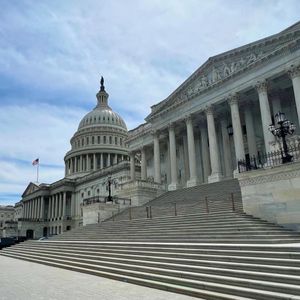Senate Begins Passage of Stablecoin Bill as House Marks Market-Structure Wins
3 min read
The U.S. Senate took the initial steps toward final approval of its first major crypto legislation as members opened voting Wednesday on the bill to set standards for U.S. stablecoin issuers, clearing the highest procedural hurdle with a 68-30 result. In a moment that will mark the industry’s greatest U.S. policy success to-date, the famously slow-moving Senate is on its way to clearing the legislation with wide bipartisan support. And as the crypto world watches the Senate reverse what had long been a crypto-resistant stance, the House of Representatives has also scored a pair of key votes to advance legislation even more vital to the industry: the Digital Asset Market Clarity Act that would establish a full set of rules managing U.S. oversight of the crypto markets. In the Senate, the Guiding and Establishing National Innovation for U.S. Stablecoins of 2025 (GENIUS) Act is the much-revised bill that had already garnered bipartisan approvals in multiple procedural votes and is now on what’s expected to be an inevitable path Wednesday. The Senate needed to clear the high bar of 60 votes to move to the final vote, which was easily obtained as many Democrats joined Republicans in pushing forward toward stablecoin regulation. The bill would establish a system under which stablecoins can be issued in the U.S. under the watch of state or federal regulators, and leaving some avenues for non-financial corporations to launch their own coins (a point of criticism from Democrats). Regulating these assets is fundamental to the operations of the crypto markets, in which dollar-based tokens such as Circle’s USDC and Tether’s USDT are routinely used in transactions and contracts. In the previous congressional session, what was then the Democrat-run Senate Banking Committee stood in the way of advancing crypto legislation, but its current Republican chairman, Senator Tim Scott of South Carolina, has become a crypto advocate. The chamber’s overall pro-crypto sentiment has been growing stronger in this session and will be further cemented by Wednesday’s votes. Before Wednesday’s voting, the GENIUS Act’s sponsor, Senator Bill Hagerty, asked his colleagues for support on the bill.”This would strengthen our fiscal position and cement the dollar’s status as the world’s reserve currency,” Hagerty argued. “If we fail to act now, not only will these benefits slip away, we’ll also fall behind in global competitiveness without a regulatory framework.But Senator Elizabeth Warren, the ranking Democrat on the Senate Banking Committee, took to the Senate floor to blast the GENIUS Act. “The GENIUS Act lacks the basic safeguards necessary to ensure that stable coins don’t blow up our entire financial system,” the Massachusetts senator said. “The bill permits stablecoin issuers to invest in risky assets and allows them to engage in risky non-stablecoin activities like private credit or derivatives trading.”Warren had a sharp message for fellow members of her party, many of whom were set to support the bill, that they “should show a little spine” and insist that Republicans allow some of the amendments pushed earlier by Democrats. When the stablecoin bill is forwarded to the House, that leaves key decision in the hands of leaders there, whether to pair the GENIUS Act with the market structure effort, or to pursue it either as a straight-up vote on the Senate’s version or a more complex process of melding the Senate’s language with legislation already in the works in the House. Whatever happens, the House will need to match the Senate’s approval at some point before a stablecoin bill can move to the president’s desk to be signed into law. While the GENIUS Act advanced, it followed a day of successes for proponents of the Clarity Act in the House , where that bill cleared the House Financial Services Committee and the House Ag Committee with big bipartisan votes in the same day on Tuesday. Crypto lobbyists in Washington argue alongside their lawmakers allies that both bills are needed to properly regulate the industry in the U.S.

Source: CoinDesk



